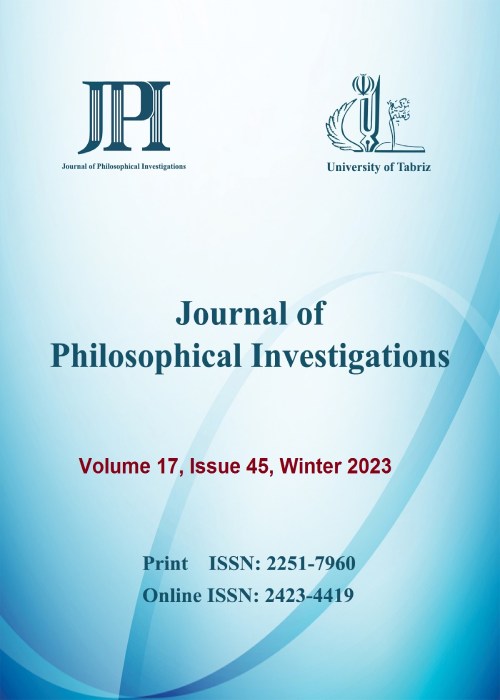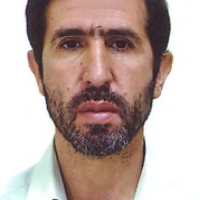odification of Aristotle's theory of definition in Avicennian logic
Author(s):
Article Type:
Research/Original Article (دارای رتبه معتبر)
Abstract:
According to Aristotle, definition is the first step to aquire scientific knowledge. And the full knowledge of objects is possible only by knowing their essence and essential definition. Following Aristotle, Avicenna thinks that the full knowledge of things is gained through the knowledge of their essence. Admitting the difficulty of understanding the essentials of objects, he states, based on his essentialist doctrine, that real definition should imply quiddity, truth and perfection of essential existence of the limited object so that it represents all its essence. But man can not identify essentials of objects and true definitions of them. Avicenna describes details of all kinds of definitions, and this article we modifies and completes the rules of Aristotle's theory of definition. In will explain it.
Keywords: Essentialism, Real Definitions, Genus and Differentia, Aristotle, Avicenna.
1.Introduction
2. Aristotelian Essentialism about Definition:According to Aristotle, sensitive perception represents the knowledge of particular objects and is not considered an example of scientific knowledge; but these very sensitive observations assist the intellect to discover the hidden universals within particular objects and pave the way for the reason to get access to the specific form of objects and distinguish between their essential and accidental features and succeed in revealing their true nature.
Aristotle in his metaphysical discussions distinguishes between real and nominal definitions and declares both of them possible and considers the real definition to be the first step for acquiring the scientific knowledge of objects. According to Aristotle, perfect knowledge of objects can be achieved merely by the knowledge of their nature and essence. Real definition of an object is a statement that expresses its essential features, without mentioning the name of the object itself in the definition. This definition is composed of genus (non-conditioned as a matter) and differentia (non-conditioned as a form), and it is always universal and affirmative.
3. Avicenna's Notion of Definition and His Critisism of Aristotelian Definition:Avicenna's words in Shifa and Isharat, like followers of Aristotle, are focused on the possibility of the knowledge of essential features of objects; in the essay devoted to the issue of definition in his book entitled Nijat, Avicenna endorses the possibility of definition and at the same time highlights the absolute difficulty of definition, including real and nominal definitions. However, in his book entitled Ta'liqat he clearly argues that true definition of objects is out of the reach of man. In his book entitled Mantiq al-Mashriqyyin, he provides a detailed discussion of various types of definition and makes some modifications in Aristotelian rules of definition.
In Ta'liqat, Avicenna declares real definition composed of genus and differentia to be impossible and criticizes Aristotle's method as incorrect. He restricts human knowledge of objects to knowing their features, requirements and accidents and denied the possibility of knowing their essential features and real definitions. He claims that the first epistemic means of human being is sense, which touches the superficial aspects of objects; then man distinguishes between identical and different perceptions using his intellectual powers and reason and thus understands some of their attributes and requirements and remains uninformed about others. If man was able to perceive the truth of objects he could be aware of all requirements; then man is not able to know the essence and truth of objects.
Moreover, difference of opinions regarding the nature of objects is a sign of human reason's inability to understand essential attributes of objects. Knowledge of the true differentia of compound objects lies beyond the ability of man's intellectual perception and he has access only to their requirements. So, man calls their common requirements as genus while he calls their special requirements differentia and particular accident. For example, thinking is not the true differentia of human being, but rather one of the requirements of his true differentia. Furthermore, simple objects have no genus and differentia so that man could know them by knowing these. For this reason, man does not have any access to the knowledge of the essence of objects. The completely immaterial objects are considered as externally simple and intellectually compound, as accidents. The essence of the completely immaterial entities is simple and lacks any matter or external form. We assume genus and differenia for them and bring these in their essential definition. Genus and differentia are declared to be mental matter and form when these are considered without any condition and in this case, they are parts of real definition, not components of simple entities. So, in fact, neither the essence of compound entities nor the essence of simple entities is accessible to man.
4.Conclusion
Aristotle believes that every object has an essence and definition aims at knowing this very essence. Aristotle's followers contend that true definition is difficult to reach, but many Muslim philosophers in general and Avicenna in particular in some of his works argue that essential attributes of objects lie beyond the limits of human intellect.Reaching the true genus and differentia of objects and knowing their essential features is not possible for man. What is declared to be the differentia of the object is in fact its logical differentia, which is in turn the requirement of true differentia. However, knowledge of some of the essential features and requirements leads to the undetailed knowledge of the truths of objects and their features. The major purpose of the definition is thus achieved and man is delivered from the vortex of doubt and sophistry.
References:
- Aristotle (2006 AD), metaphysics, translated by Mohammad Hassan Lotfi, Tehran, Tarh-e-now, 63
- Ibn Sina, Hussein bin Abdullah (1982 AD), Mantiq Al-Mashriqiyin, Shukri al-Najjar’s introduction, Beirut, Dar Al-hedatheh, 59-67
- Ibn Sina (1404 AH), Al-ta’liqat, Abdul Rahman Badawi’s research, Qom, School Al-Alam al-salami, 34
Keywords:
Language:
Persian
Published:
Philosophical Investigations, Volume:12 Issue: 25, 2019
Pages:
173 to 187
magiran.com/p1935406
دانلود و مطالعه متن این مقاله با یکی از روشهای زیر امکان پذیر است:
اشتراک شخصی
با عضویت و پرداخت آنلاین حق اشتراک یکساله به مبلغ 1,390,000ريال میتوانید 70 عنوان مطلب دانلود کنید!
اشتراک سازمانی
به کتابخانه دانشگاه یا محل کار خود پیشنهاد کنید تا اشتراک سازمانی این پایگاه را برای دسترسی نامحدود همه کاربران به متن مطالب تهیه نمایند!
توجه!
- حق عضویت دریافتی صرف حمایت از نشریات عضو و نگهداری، تکمیل و توسعه مگیران میشود.
- پرداخت حق اشتراک و دانلود مقالات اجازه بازنشر آن در سایر رسانههای چاپی و دیجیتال را به کاربر نمیدهد.
In order to view content subscription is required
Personal subscription
Subscribe magiran.com for 70 € euros via PayPal and download 70 articles during a year.
Organization subscription
Please contact us to subscribe your university or library for unlimited access!



